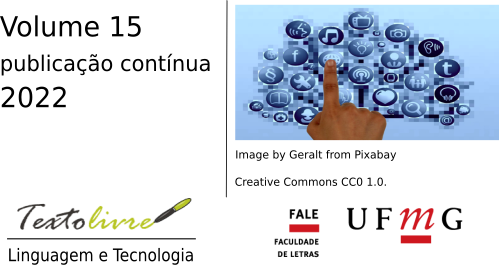Neurociência cognitiva
melhoria do pensamento autônomo na leitura através de videogames
DOI:
https://doi.org/10.35699/1983-3652.2022.40506Palavras-chave:
Inovação, Leitura, Dificuldades de leitura, Videogames, Pensamento autônomoResumo
Com o objetivo de demonstrar as altas capacidades de leitura em alunos com dificuldades de aprendizagem, como a dislexia com o uso de videogames, realizamos uma pesquisa com alunos do Ensino Fundamental. Para isso, revisamos parte da literatura a fim de apresentar e justificar um estudo de caso real de uma criança de oito anos com dificuldades de leitura. Os videogames têm sido usados para constatar como ele melhorou seu aprendizado. Para isso, testamos suas capacidades com um teste padronizado (DIP-le) de leitura e fizemos um acompanhamento com um videogame chamado DytectiveU, que deve superar sua dislexia. Constatamos com o mesmo teste que quanto mais a criança joga esse jogo, melhores capacidades e habilidades de leitura ela desenvolve. Por fim, demonstramos e constatamos os benefícios do uso de videogames no diagnóstico psicopedagógico e no rastreamento psicopedagógico. Esperamos aumentar o uso de videogames nas clínicas psicopedagógicas devido aos seus grandes benefícios.
Downloads
Referências
AULAGNIER, P. La violencia de la interpretación (2a ed, 1a reimp): Del pictograma al enunciado. Buenos Aires: Amorrortu, 1975.
CASAS DE PEREDA, M. En el camino de la simbolización: producción del sujeto psíquico. 1a ed. Buenos Aires: Paidós, 1999.
DERRIDA, J. De la gramatología. México: Siglo XXI, 1967.
GOODMAN, K. El proceso de lectura: consideraciones a través de las lenguas y el desarrollo. In: FERREIRO-GÓMEZ, P. (Ed.). Nuevas perspectivas sobre los procesos de lectura y escritura. Buenos Aires: Siglo XXI, 1980. p. 13–28.
HORNSTEIN, L. Aulagnier: sus cuestiones fundamentales. In: CUERPO, historia e interpretación. Buenos Aires: Paidós, 1994. p. 11–116.
RELLO, L.; BAEZA-YATES, R. How to present more readable text for people with dyslexia. Universal Access in the Information Society, v. 16, n. 1, p. 29–49, Mar. 2017. DOI: 10.1007/s10209-015-0438-8. Available from: http://link.springer.com/10.1007/s10209-015-0438-8. Visited on: 20 Sept. 2022.
RELLO, L.; SAGGION, H.; BAEZA-YATES, R. Keyword Highlighting Improves Comprehension for People with Dyslexia. In: PROCEEDINGS of the 3rd Workshop on Predicting and Improving Text Readability for Target Reader Populations (PITR). Gothenburg, Sweden: Association for Computational Linguistics, Apr. 2014. p. 30–37. DOI: 10.3115/v1/W14-1204. Available from: https://aclanthology.org/W14-1204. Visited on: 20 Sept. 2022.
WETTENGEL, L. Producción simbólica y lenguaje: algunas revisiones conceptuales. [S.l.]: Dto. de Publicaciones. Fac. Psicología, UBA, 1995.
Downloads
Publicado
Edição
Seção
Licença
Copyright (c) 2022 Paula Aguadero Ruiz

Este trabalho está licenciado sob uma licença Creative Commons Attribution 4.0 International License.
Este é um artigo em acesso aberto que permite o uso irrestrito, a distribuição e reprodução em qualquer meio desde que o artigo original seja devidamente citado.











